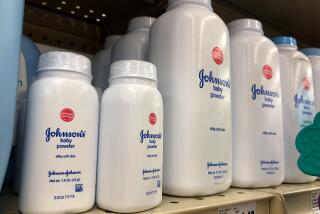Upjohn Wins Another Legal Challenge Over Halcion : Pharmaceuticals: A federal judge in Massachusetts dismisses a claim that the sleeping aid caused a suicide.
- Share via
DETROIT — Upjohn Co. has again beaten back legal claims that its sleep-inducing drug Halcion causes bizarre and sometimes violent behavior.
But the company and some drug industry analysts said Thursday that they are skeptical about whether such victories will do much to change an image problem that has led to sinking sales.
“It’s very difficult to undo the story that gets implanted in people’s minds when there’s a whole string of negative media about the product,” Upjohn spokeswoman Kaye Bennett said. “When patients say, ‘Don’t ever give me that drug Ed Bradley talked about on ’60 Minutes’ last night,’ (doctors) aren’t going to spend much time arguing . . . “
Upjohn won a civil case Wednesday in Worcester, Mass., in which it was claimed that the drug caused a user to commit suicide. A federal judge issued a directed verdict dismissing the claim.
It is the third time the drug maker has been exonerated of allegations that Halcion, once the most widely prescribed sleeping drug in the world, can cause suicidal, homicidal or psychotic behavior.
Critics contend that Halcion can also cause depression and short-term memory loss.
About 100 lawsuits involving Halcion have been filed against the Kalamazoo, Mich., company. Upjohn has settled some, Bennett said, but she declined to elaborate.
In court, Upjohn has lost one case, and even that was a partial loss. In 1992, a jury found Upjohn 20% responsible for the actions of a man who killed his best friend. The man and his doctor were given the rest of the blame.
The company has maintained that Halcion is safe and effective when used as recommended. Even if someone uses too much, Bennett said, “there is no scientific evidence . . . it causes any unexpected behavior.”
Halcion came under worldwide scrutiny in 1991 when British medical authorities banned its sale there because of concern over side effects.
In 1992, the U.S. Food and Drug Administration ruled that the drug could stay on the market in smaller dosages and carrying stronger warnings.
Halcion hit its sales peak in 1988, when it generated $258 million for Upjohn. It was the company’s No. 2 seller, behind the anti-anxiety drug Xanax.
Sales dropped precipitously after the controversy erupted in 1991. By 1993, sales had dropped to $121 million, and they have continued to decline.
Adding to Upjohn’s worries is the fact that as of last fall, Halcion no longer enjoys patent protection. This means generic versions of it could be sold. There have been none so far, Bennett said.
Two New York analysts say the legal victories should help Upjohn fight any future legal claims and reassure patients who already use the drug. But the persistence of the image problem and the threat of generic competition mean the days of strong sales are over, they said.
“The Catch-22 for Upjohn is that if demand for Halcion were to increase because this cloud is slowly being lifted, (then) as soon as it becomes a product of significance, the more likely they are to face generic competition,” said Carl Seiden, a drug analyst with Sanford C. Bernstein.
“Halcion is unlikely ever to return to its robust period of sales growth, whether they experience legal victories or not,” PaineWebber analyst Ronald Nordmann said. “It’s an old, mature drug in decline and has lost its patent.”
But at least one analyst, Sharon Dorsey Wagoner of Argus Research, believes the legal victories could have a stronger effect.
“I don’t think the damage is irreparable,” Wagoner said. “If the company can show efficacy or improve the image and offset the damage . . then there is a chance for almost any product to regain lost market share.”
More to Read
Inside the business of entertainment
The Wide Shot brings you news, analysis and insights on everything from streaming wars to production — and what it all means for the future.
You may occasionally receive promotional content from the Los Angeles Times.










